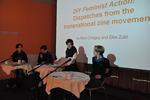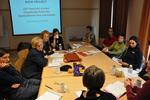Civil Media: What makes it democratic?
type=blog
There's a certain magic that goes with participating in Salzburg's annual Civil Media Unconference, www.civilmedia.eu (and not just because it takes place in the land of the Sound of Music).
We were there talking about feminist zines and blogs, and enjoyed every minute. This radical, participant-led three day gathering brings together media practioners, policy makers, researchers, tech heads, and social change enthusiasts for ongoing discussions and networking around a range of grassroots media concerns (and the programme is pieced together collaboratively online, through a wiki).
Over 100 folks turned up last December and both gums and laptop lids were flapping around the question of "Cultures-Participation-Dialogue". So, we want to know, what makes grassroots media "democratic"?
I guess we need to start with a definition of "grassroots". For me, it implies media which is organized, and sustained, through community/small groups with a participatory agenda and on a small scale. Maybe think- community radio. You wanna go on air? Go down to your local grassroots station and maybe they'll train you up.
Maybe it's that political newspaper that you try and flog on the street corner every month (does anyone do that anymore apart from the socialists?)- a paper put together by a scramble of writer and editors, maybe no one gets paid, and it's used for propaganda above all else. Grassroots certainly has an activist tinge to it- all fists in the air, righteous anger, and small, long, committed responses to changing the status quo.
And what role does the internet play in changing media and making it more democratic and participatory?
Strictly speaking a "democracy" is the freely-elected people's choice of government. As a political philosophy, according to everybody's quick reference friend Wikipedia, "there are two principles that any definition of democracy includes. The first principle is that all members of the society (citizens) have equal access to power and the second that all members (citizens) enjoy universally recognized freedoms and liberties."
How does this translate to media making? I guess this is what we would like to hear from you through this site... What is grassroots media? In what ways does it become a democratic or participatory media form? Is there something 'extra' participatory about feminist media?
Why not take our quick survey (go look at the right hand side bar of the website) and let us know- else feel free to comment on these blog posts and add to the forum!
xred
Photos by David Roethler
Civil Media Blog post by Irfan Raja [http://100yearsofnuj.wordpress.com/2008/12/09/british-academics-receive-warm-welcome-for-their-contribution-to-civilmedia-08-in-salzburg-austria/]
- redchidgey's blog
- Login or register to post comments





Comments
Were the demonstrations for
Were the demonstrations for the civil rights movement or war protests organized? Can you say biased media? I mean the media, the white house, and the posters here seem to forget that the protests against war, civil rights protests, and the celebration of OJ getting off of his criminal trial were all organized.
maryleen
Hi Maryleen...can you say a
Hi Maryleen...can you say a little bit more? I'm not sure if I follow your comment...do you mean that alternative/grassroots media is also biased? Thanks!